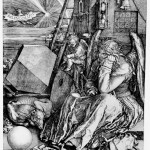 Melancholy and Solitude in the History of Ideas and Art History
Melancholy and Solitude in the History of Ideas and Art History
A type of artist established himself in western culture once Marsilio Ficino took up Chapter XXX, I of the pseudo-Aristotelian Problems, where the creative figure is already described as manic and melancholic by his very nature. Melancholy hence became the condition of genius, the dark shadow to the clarity of artistic production. The diagnosis of ‘melancholy’ was removed from clinical vocabulary in the course of the twentieth century and replaced by a fundamentally different conceptual apparatus. No longer identified as the defining and formative characteristic of genius, it was instead reluctantly conceded to be a brief clouding of the mind described as a case ‘of’ melancholy. Yet the psychopathological concept of melancholy and its history remain central subjects of research in the humanities. This is due in no small part to the pioneering work of Raymond Klibansky, Erwin Panofsky, and Fritz Saxl in “Saturn and Melancholy”, whose complex, fateful genesis and interdisciplinary orientation ensured it significant receptions on both sides of the Atlantic. The interdisciplinary claim formulated by its subtitle, “Studies in the History of Natural Philosophy, Religion, and Art,” moreover suggests how pragmatically the book anticipates the potential of today’s loudly proclaimed buzzwords of inter-, infra-, or trans-disciplinary collaboration between various academic fields. The claim is redeemed in the book’s four chapters: the first offering a conceptual history of melancholy in antiquity and in the Middle Ages; the second treating representations of the ancient god Saturn’s afterlife in visual as well as written evidence; the third discussing poetic melancholy in Neoplatonism; and the final interpreting Dürer’s famous copper engraving “Melencolia I”. Engagement with Klibansky, Panofsky, and Saxl’s book appears rewarding today not only on account of its key position in the history of sciences, but also because a precise reading of “Saturn and Melancholy” has the potential to contribute to a new theoretical and methodological redefinition of the relation between the history of ideas and iconology-driven art history. The book thus enables more rigorous understandings of the relationship between historical objects and phenomena. The field of these concerns should be addressed within a four-day research workshop. Researchers working in the disciplines addressed within “Saturn and Melancholy” are invited to give presentations of current projects and to discuss them within a group setting. In addition, texts within these fields will be together read and analyzed. The central objective will be bringing together young career academics in the fields of intellectual history, the history of medicine, art history, literary, and religious studies as well as philosophy. Moreover, the selection of invited presenters will prioritize including experts from all fields of research touching upon the rich, multifaceted character of “Saturn and Melancholy”. Workshop languages are English, French, and German. Possible topics include the following:
– Theories of iconology and the history of ideas
– Melancholy and solitude in psychology and medicine
– Melancholy and the stars: astrology and other forms of divination
– Melancholy and solitude as component of religious practice and experience
– Research on the concept of genius and conceptions of the artist
– Research in the history of emotions vis-à-vis melancholy and solitude
Proposals may concern materials from all eras since antiquity. Case studies drawn from non-European cultures are also welcome, as are all topics related to visual and textual traditions, receptions, and their carriers. Please send your proposal and an abridged CV to dominic.delarue@arts.kuleuven and john.raimo@nyu.edu before 2/28/2016. The event takes place on the Buchnerhof, the meeting center of the Elisabeth and Helmut Uhl Foundation, in South Tyrol. Accommodation and meals during the event are supported by the Foundation. Modest travel allowances are possible.

Leave a Reply
You must be logged in to post a comment.